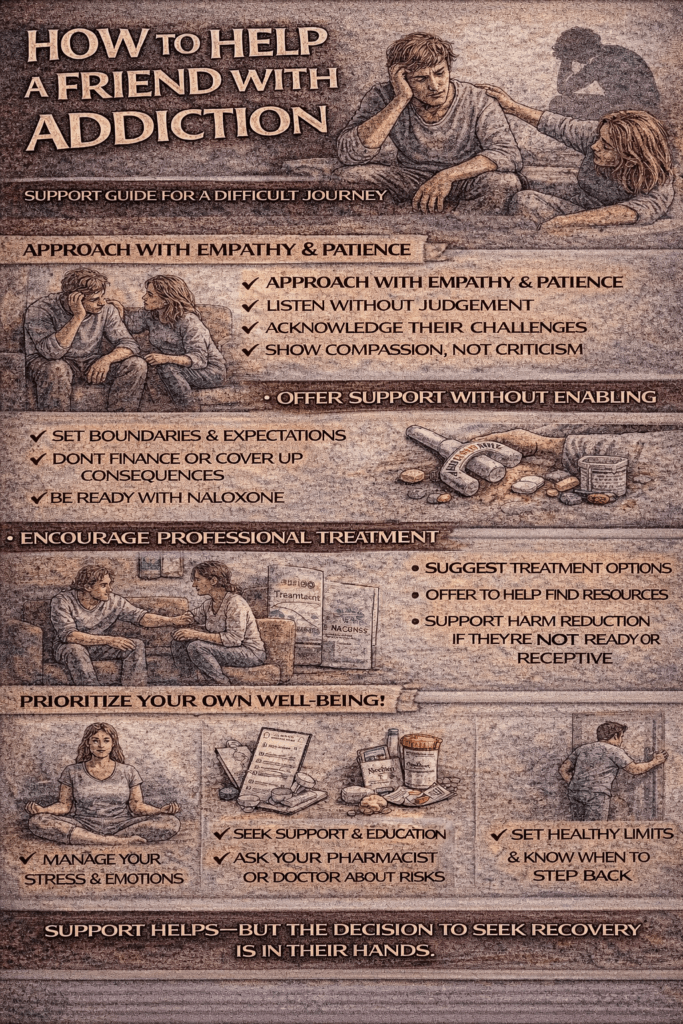Battling addiction is a tough road, and having support from friends can make a meaningful difference for someone going through it. Sometimes, figuring out what helps (and doesn’t) can be confusing. If you’re looking for ways to truly show up for a friend facing addiction, guidance from experts and people who’ve been there can be really helpful. So, I put together this guide with clear, research-backed tips to support someone you care about while keeping boundaries, building understanding, and helping both of you stay healthy.
Understanding Addiction and Your Role as a Friend
Supporting a friend through addiction isn’t always straightforward. Addiction is a complex health issue, not a weakness or moral failing, so it can help to reframe what you know. According to the Substance Abuse and Mental Health Services Administration (SAMHSA), addiction impacts the brain’s reward, motivation, and memory circuits. It often leaves people feeling powerless, even when they’re desperate to stop.
Your job as a supportive friend isn’t to fix the problem or act as a therapist. Instead, the best way to help is by being consistent, patient, and nonjudgmental. It’s also essential to get familiar with what addiction actually is and how it changes a person’s behavior. Learning these things will help you avoid misunderstandings and make things less complicated for your friend.
Respect makes a difference: keeping conversations private, showing empathy, and avoiding blame make it easier for your friend to feel safe opening up to you.
Practical Ways to Show Support
There’s no “one-size-fits-all” plan, but experts agree on a handful of practical things friends can do that encourage recovery and provide comfort:
- Listen More, Talk Less: Sometimes, the most significant gift you can give is simply listening without trying to fix things or give advice. Your friend likely hears plenty of opinions; they might need a safe space to vent and work through their feelings.
- Offer Consistent Support: Regular check-ins, whether a quick text or grabbing coffee, help remind your friend that they don’t have to go through this alone. Small actions can make a surprisingly significant impact.
- Encourage Healthy Activities: If your friend is open to it, invite them to join you for activities other than substances, like taking a walk, seeing a movie, or picking up a new hobby. These different routines can ease the pressure and help distract from cravings.
- Avoid Lecturing or Ultimatums: Threats or harsh words rarely help and can push someone further away. Expressing care is always more effective than giving ultimatums.
Remembering that your friend may have significant and challenging days is also good. Being steady and not letting one rough moment define your support helps them feel accepted, which can play a huge role in recovery.
What to Avoid: Common Pitfalls in Supporting a Friend with Addiction
Even with the best intentions, it’s easy to make mistakes when trying to help. I’ve learned, sometimes the hard way, that some everyday actions do more harm than good. Here’s what to watch for:
- Don’t Enable: Covering for your friend, giving them money, or making excuses for their behavior might feel helpful in the moment, but it often keeps the cycle of addiction going. Instead, encourage responsibility while showing you care.
- Don’t Take Things Personally: Addiction can make people act in ways they never would otherwise. If your friend lashes out or pulls away, it’s usually about their struggle, not about you. Protecting your own boundaries is essential here.
- Don’t Isolate Yourself: Supporting someone with addiction can be draining. Keep your support network close, talk about your feelings, and don’t hesitate to get help if you need it.
- Don’t Ignore Warning Signs: If you notice significant changes like depression, talk of self-harm, or aggressive behavior, it’s worth reaching out to a professional for advice. These issues can mean your friend needs more support than you can give alone.
Staying sharp and caring for yourself helps ensure you can give solid, reliable support without sacrificing your own well-being.
Tips for Having Real Conversations About Addiction
Starting a conversation about your friend’s addiction can be nerve-racking. Here’s my go-to approach:
- Pick the Right Moment: Talking seriously when your friend is intoxicated, upset, or distracted won’t go well. Choose a calm time when you’re both rested and have privacy.
- Use “I” Statements: Focusing on your perspective (“I’ve noticed you seem tired lately, and I care about you”) instead of accusations (“You’re ruining your life”) keeps things from feeling like an attack.
- Be Prepared for Defensiveness: Denial is common. Even if your friend isn’t ready to talk, knowing they can come to you later matters.
If they do want to talk, great. If not, remind them that the door is always open. Sometimes, patience is the most excellent support you can offer.
Encouraging Professional Help (Without Pressure)
Most successful recoveries involve professional treatment, including therapy, counseling, inpatient programs, or local support groups. The trick is presenting these ideas gently without making your friend feel judged. Here are some ways that have worked for me and others:
- Say you’re worried about them and want to help however you can.
- Offer to look up local resources together or even make an appointment with them if they’re nervous.
- Share stories or information about others who’ve gotten help, especially if it’s someone your friend respects or relates to.
- Be patient if they aren’t ready yet; sometimes planting the seed is the biggest thing you can do now.
For resources and support groups, try checking out FindTreatment.gov or Alcoholics Anonymous. People often stumble upon hope after hearing about others’ experiences and options.
Protecting Your Own Well-Being
Helping a friend through addiction can take a real toll emotionally. Self-care isn’t selfish; in fact, it gives you the energy actually to be supportive. Here’s what I find particularly useful:
- Set boundaries about what you can and can’t help with; it’s okay to say no when necessary.
- Stay active in your interests, goals, and relationships so your world doesn’t revolve only around your friend’s situation.
- Connect with local support groups (like Al-Anon) meant for friends and families of people with addiction. These folks get it, and swapping stories can really help.
Looking after your well-being isn’t just recommended—it’s necessary to be a steady presence for your friend over time.
Expert-Approved Resources to Share
If your friend expresses interest in getting help, having a list of valuable resources ready is key. Here are some experts who regularly share:
- FindTreatment.gov – An online tool to find mental health and addiction services by ZIP code.
- SAMHSA National Helpline – 1-800-662-HELP (confidential, totally free help line).
- Alcoholics Anonymous – For local meetings and valuable information.
- Al-Anon Family Groups – For friends and families of people struggling with alcohol use.
It’s reassuring for your friend to know they don’t need to figure this out alone. Just having the first step mapped out can lighten the burden a lot.
Frequently Asked Questions about Supporting a Friend Battling Addiction
These are questions I often hear from people who want to do the right thing for someone they care about:
Question: What if my friend denies they have a problem?
Answer: This always happens, so try to stay gentle and patient. Instead of pressuring, let them know you’ll always be there to listen or help when they’re ready. Consistency pays off more than a single conversation.
Question: How do I know if I’m helping or enabling?
Answer: Helping means being supportive without covering up or removing the natural consequences of your friend’s choices. For example, offering a ride to counseling is supportive. Lying for them at work is enabling. If unsure, ask a counselor or join a group like Al-Anon for more guidance.
Question: Should I tell other people about my friend’s addiction?
Answer: Confidentiality means a lot. Unless your friend is harming themselves or someone else, keep what they share private, unless you get explicit permission to tell someone (like a family member or counselor).
Wrapping Up: Steps Toward Safe, Supportive Friendship
Showing up for a friend struggling with addiction is about being a steady, kind, and informed ally. Focus on being available, listening, and staying open to learning; encourage healthy choices and professional support when your friend seems ready. Don’t forget to protect your well-being because that allows you to stick by your friend for the long haul.
If you are unsure of what to do next, reach out for professional advice, whether from counselors, helplines, or local support groups. That way, you and your friend both have support for the challenges that come with addiction—and neither of you has to go through it alone.
Video: How To Really Help A Friend With Addiction

